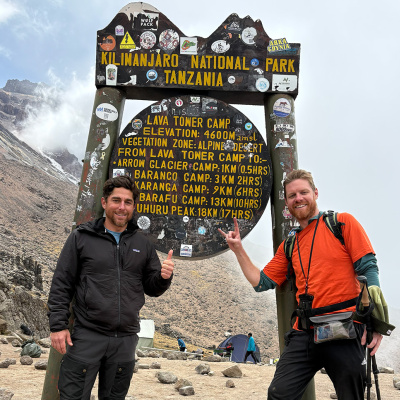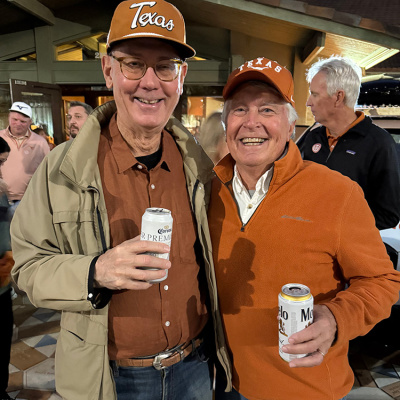CIA Director Pompeo Speaks at UT National Security Forum

In the early morning of Oct. 13, students, faculty, service members, and many others took their seats in the ballroom of the Etter-Harbin Alumni Center, waiting for the 2017 Texas National Security Forum to begin.
Billed as a premier national security summit not only for the university but the state of Texas and the nation, this year’s symposium was titled “Alliances and Partnerships in American National Security.” The event’s co-sponsors included the Clements Center for National Security, the Robert S. Strauss Center for International Security and Law, the Intelligence Studies Project (ISP), Stratfor, the Texas National Security Network, and the Lyndon B. Johnson School of Public Affairs.
To kick off the event, the directors of the Clements and Strauss Centers, Will Inboden and Bobby Chesney, respectively, celebrated the history of the conference, now in its fourth year. They hailed UT’s commitment to the study of intelligence and national security as well as its active involvement in these fields. They touched on the indispensability of alliances, an explicit theme and persistent talking point throughout the day.
Guests were treated to a roster of men and women that have served in the highest ranks of the U.S. military, NATO, intelligence agencies, diplomatic missions, and the executive branch. Mike Pompeo, director of the Central Intelligence Agency, delivered keynote remarks.
Over coffee, tea, and a light breakfast, the conference kicked off with a panel on alliances from a defense perspective. Panelists, drawing from their own experience in the highest levels of decision-making, discussed the importance of coalitions. On military partnerships and coalition building, panelist Troy Thomas remarked: “Relationships are hard, but they are worth it.” Panelists also noted that more funding for diplomatic arms of the U.S. government, such as the State Department and the Agency for International Development, is money well spent.
Next up was a discussion on alliances from an intelligence perspective. Panelists discussed intelligence sharing, cybersecurity, and balancing domestic privacy concerns with information gathering. After a lunch break, UT President Greg Fenves took the stage to introduce Pompeo. He described the event as one of many opportunities on campus “to engage, learn, [and] listen.” Fenves jokingly recalled UT’s nail-biter win over Kansas State the past weekend, and presented Pompeo—a former U.S. congressman from Kansas—with a personalized burnt-orange jersey.
The contents of Pompeo’s keynote, as well as a subsequent discussion with moderator and ISP director Stephen Slick and members of the audience, were wide-ranging. Slick expressed profuse gratitude and respect for the agency’s operatives and defined the agency’s fundamental purpose: “We are in the business of stealing secrets.” He disparaged Iran, calling it a “thuggish police state” and “despotic theocracy,” in the wake of Trump’s decision to decertify the Iranian nuclear deal. Pompeo also likened Wikileaks to a hostile foreign intelligence service, prompting a Twitter response from Julian Assange himself.
“Whatever we’ve discussed, the challenges our entity is facing, he has given us what we need,” Pompeo said of President Trump’s support for the agency. Pompeo provides Trump with daily briefings. “I told the president I was coming out that way and he just said, ‘make sure you recruit a few good ones [from UT],'” Pompeo said. He spoke directly to the students in the crowd, calling on them to consider the CIA or a career in public service.
Pompeo, who doesn’t often speak publicly, fielded questions from Slick, students, and reporters about an evolving threat landscape, cybersecurity, North Korea, and the agency’s strategies to target non-state actors. Lawrence Wright of the New Yorker and Eric Schmitt of the New York Times both questioned Pompeo, who had heated words for the latter publication’s decision to publish the name of a covert CIA agent: “I am deeply respectful of First Amendment freedoms, but it’s the case when (the Times) publishes one of our operative’s names, I find that deplorable.”
Subsequent panels focused on diplomatic perspectives on alliances and international financial policy. Former envoys and ambassadors on the panel lamented a sense of American diplomatic retrenchment and a preference for force-based decision-making. “Diplomacy requires diplomats,” said panelist David Kramer. “It pains me to see how many [appointed] positions are unfilled.” The financial policy panelists discussed how financial warfare is growing in scope and frequency and how sanctions and other policies might be used to mitigate this risk.
As he wrapped up his speech, Pompeo thanked the university and paid tribute to three Texan CIA operators that lost their lives in the line of duty. "[They] embodied the spirit of Texas. They were brave, big-hearted, faithful, and adventurous. And we are eternally honored and grateful that they chose to serve their country."
Photo courtesy of Clements Center for National Security






